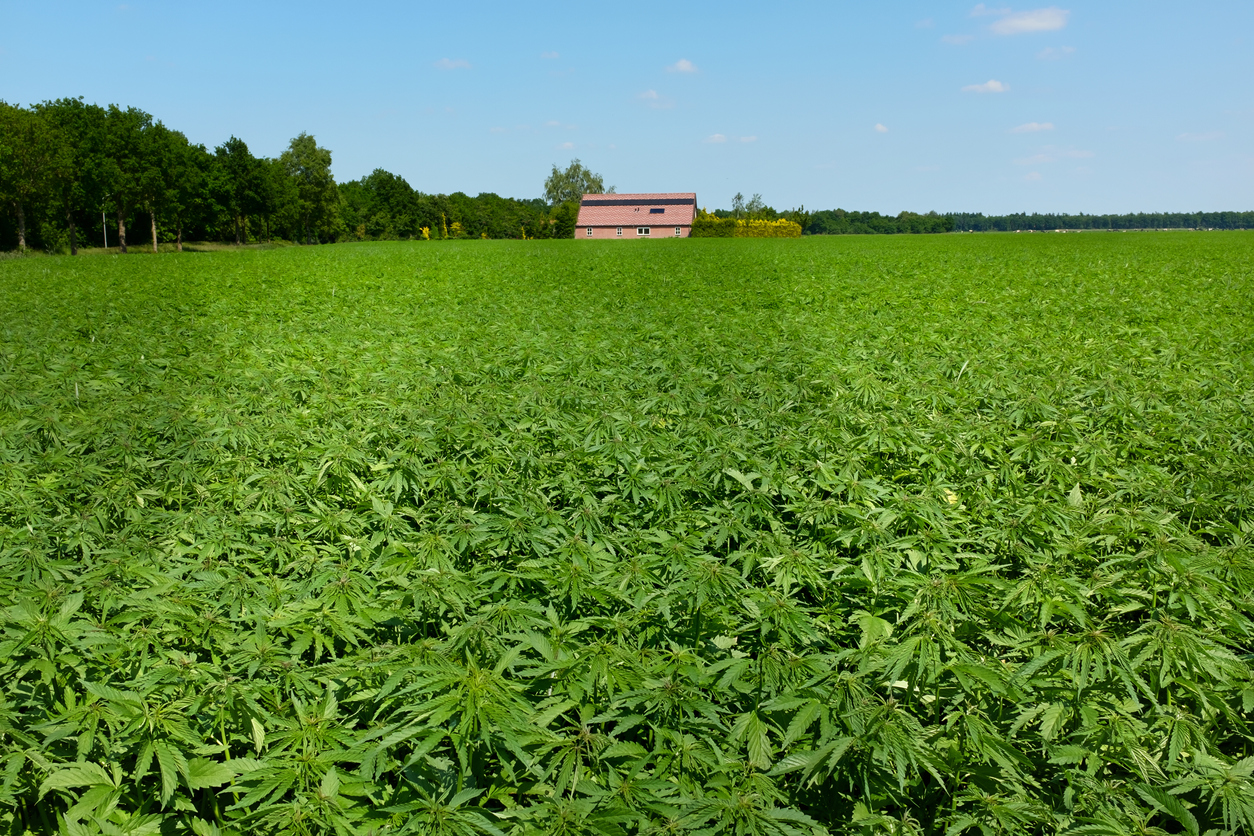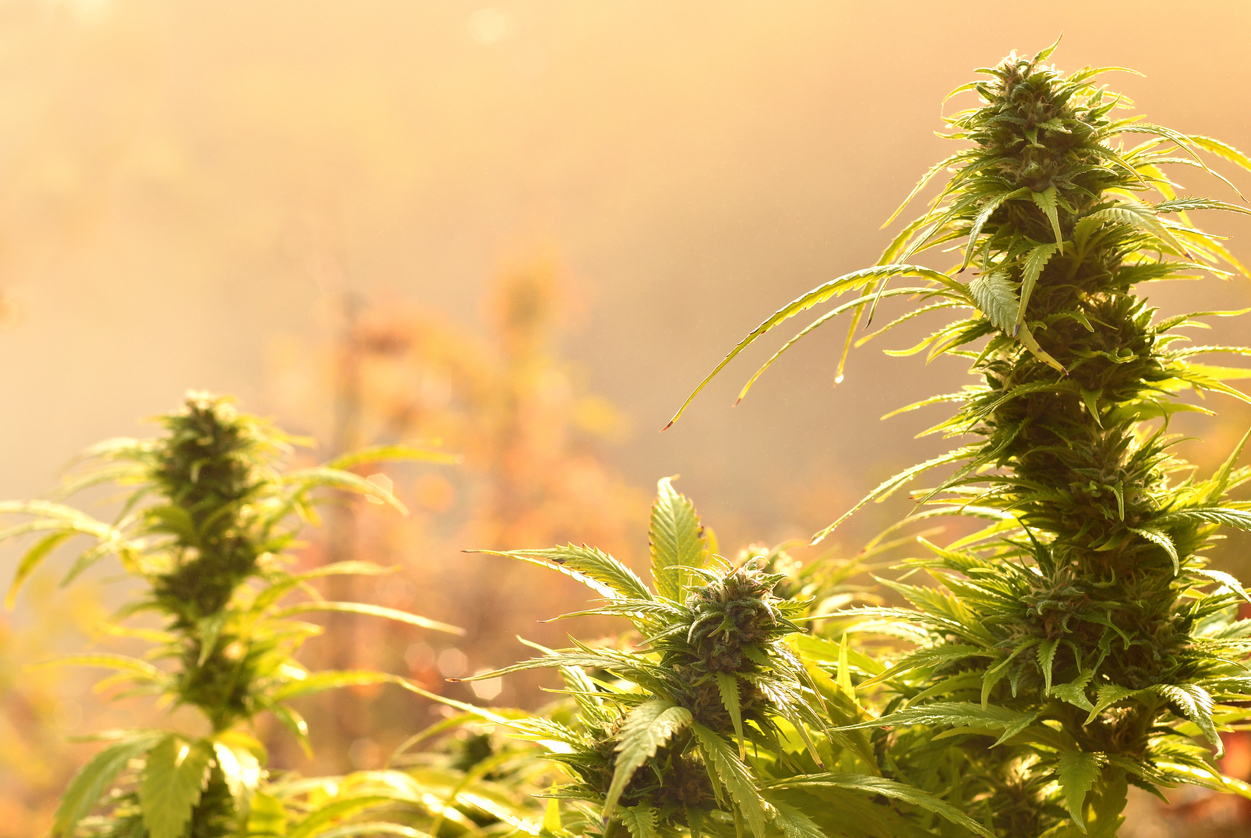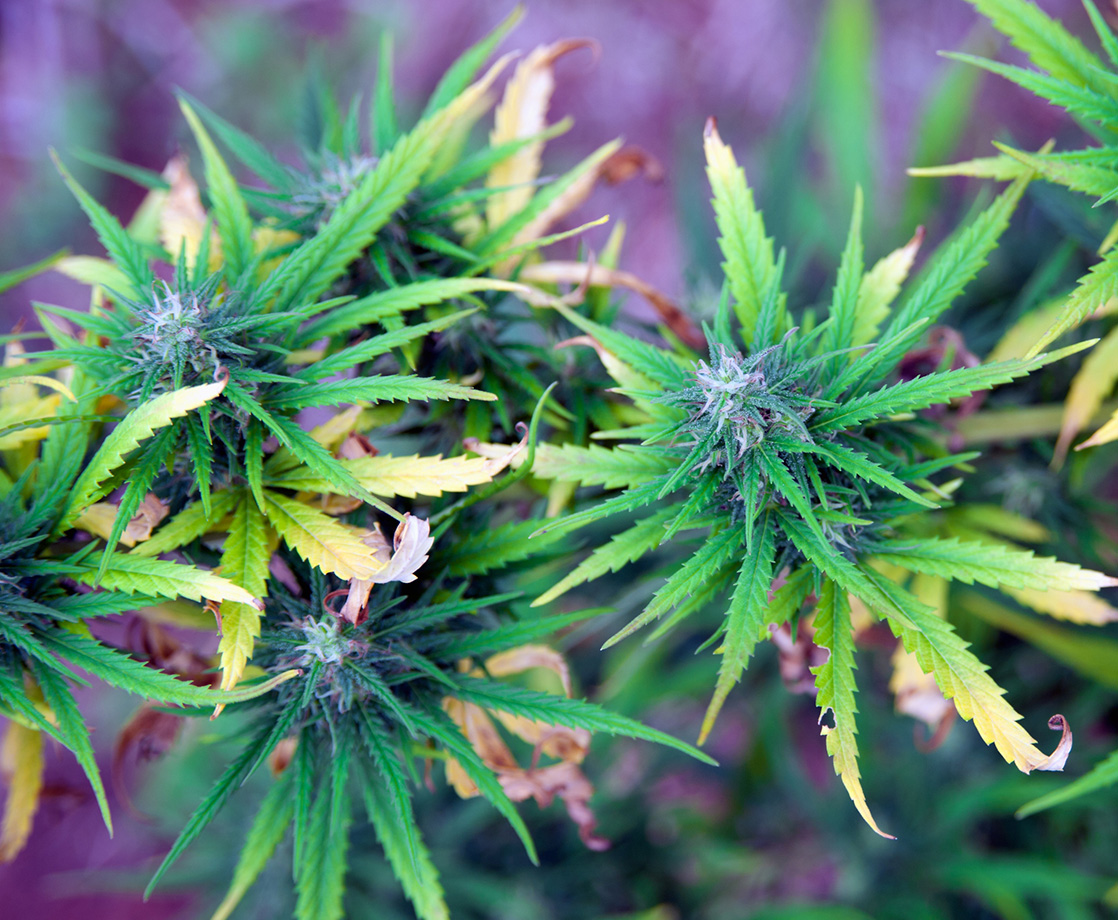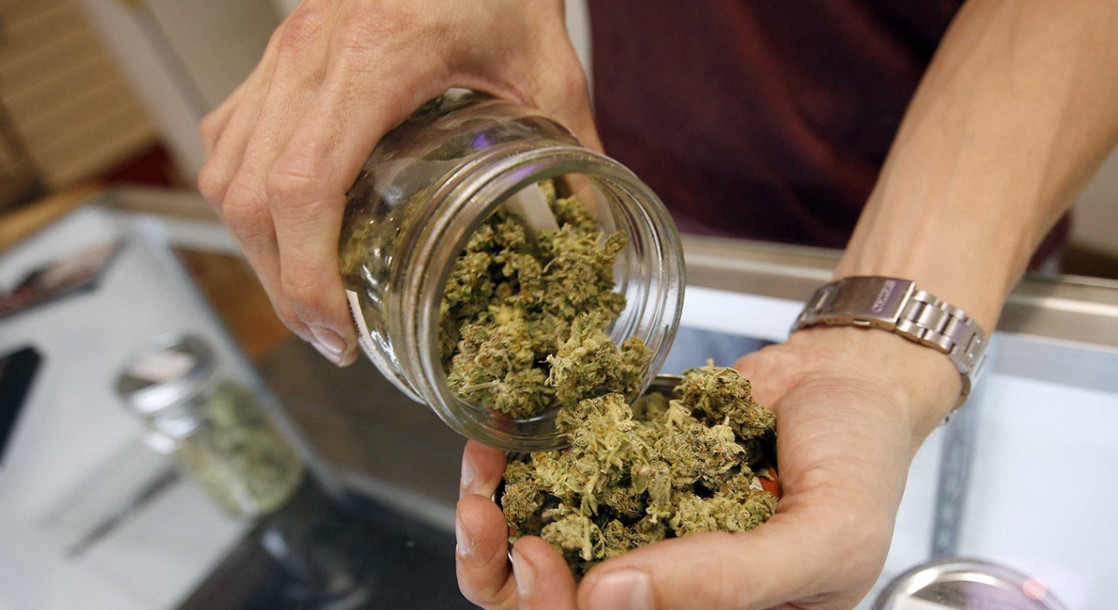Peter Kielland has some strong views on the young cannabis industry in Canada. The strongest and most consistent among those views is that he simply doesn’t like it. “I’m kind of a rebel,” he tells me, after we met at the Cannabis and Hemp Expo, held in Ottawa, Ont. at the end of November, a few days earlier. “You probably bumped into other people [at the Expo] who were also not at all pleased with the legislation.” This was true. Even so, Kielland stood out. As he was giving me a tour of his website on his iPad — half e-commerce website for his invention, called the Cannabis Caddy; half libertarian canna-festo for — he points to a line of text.
“Look: here, I call them Kannabis Kings,” he says, clicking a link rendered in a sort of sloppy comic sans-esque font. Virtually everything on Kielland’s website links out to somewhere. Some take you further into his own digital ecosystem to pages with titles like “Cannabis Revolution”; others take you to news articles he likes. On some pages, he embeds YouTube videos with songs that fit them (the page Cannabis Revolution includes a video of The Beatles’ song “Revolution”).
The link he clicks takes us to a list, published by NOW Magazine, of all the ex-cops, politicians, lobbyists, and political staffers that are now cashing in on the legal pot biz in one way or another. Kielland is evidently not so pleased about this. Further down the page, he quotes Shakespeare:
“Oh Gentleman / The time of life is short / and if we live / we live to tread on kings.”
Kielland is an inventor, in the classic, garage-workshop sense. He’s here showing his latest invention: the Cannabis Caddy which, in simple terms, is a mobile outdoor weed growing unit. It is essentially a large flower box on wheels, but one that is designed for the specific requirements of growing cannabis. There is only one of them in existence, for now — the one that Kielland, on a rainy Saturday in November, has wheeled into this trade show.
It is also probably the only gardening device that comes with a sales pitch that Ayn Rand would be proud of. “Corporate cannabis controls you,” reads Kielland’s website. “Cannabis Caddy sets you free.” For Kielland, the Cannabis Caddy isn’t just another invention, but a physical manifestation of the way Kielland feels about the current state of the cannabis industry.
He is unambiguously, and unapologetically, radical when it comes to weed and home growing. His website boasts several calls for people to “start a revolution” and to “take back control,” though it’s not exactly clear against, and from, whom. For Kielland, growing your own weed is not only a statement on the cannabis industry, but a statement on life under government.
“This is kind of the dandy style of ‘don’t buy the government salt, we’ll get our own salt,’” he tells me. It’s “just to show the government that you’re free, and not a slave.”
A bit of a theme that has developed, curiously, in opposition to the government’s legalization. Home- and micro-scale growing is not just a cheaper and more involved way of procuring your own cannabis. For some, it’s a political statement, a way of stepping outside the largely commercialized and largely profit-driven system through which cannabis is produced and sold in the Great White North. It’s not a perfect rebellion, nor a complete one — you still have to buy your original seeds or clones from that market — but it is at least a statement of some sort of principle. With an array of alternatives set to open up to the market, from micro-growing to outdoor farming to home growing, opponents of the way the government has gone about legalizing weed may now have (what they see as) a more socially conscious alternative to supporting Big Weed — an industry that has, for the most part, escaped scrutiny for its close ties to political parties and ex-police leadership.
Last week, Newfoundland became the first province to put cannabis plant clones on sale for the general public. Until then, the allowances in the Cannabis Act for home growing — up to four plants per household, subject to further provincial restrictions — were mostly hypothetical, since you couldn’t actually buy seeds or clones. With the start of clone sales in Newfoundland, the home growing market was officially opened.

For years, cannabis legalization has been a darling issue for people across the political spectrum; it’s an appealing policy, albeit in different ways, to both progressives on the left, libertarians on the right and pro-business centrists. It might come as a bit of a surprise, then, that legalization already had opponents from within the cannabis community. But those opponents tend to view the growing cannabis industry with the same suspicion as they view corporate capitalism (and more specifically, the pharmaceutical industry), writ large: as a system that doesn’t place consumers’ interest front and center.
Mike DeVillaer, a professor of drug policy at McMaster University in Hamilton, Ontario, has been beating this drum for a while. In a lengthy 2017 paper titled “Cannabis Law Reform in Canada: Pretense and Perils,” DeVillaer makes the case that the legal cannabis system in Canada was, to its detriment, “profit-driven and poorly regulated” — a paradigm that he calls “a dangerous one.”
“The cannabis industry and the Canadian government appear to be engaged in a process of ensuring that revenues for both parties prevail over considerations of due process to protect public health,” writes DeVillaer. In the paper, he calls for the creation of a “not-for-profit cannabis authority” that would function with “a genuine public health priority.”
DeVillaer is not a home growing, anti-government advocate by any means — his call for a government-run non-profit weed company seems definitionally left-wing — but many of his criticisms, a year or so after he wrote about them, still form the basis of what people like Kielland see as a problem in the industry.
“In a big way, I think the horse is out of the barn,” DeVillaer tells me. “We have a very much profit-driven system. What we would be looking for is some kind of opportunity to revisit the model we are using.”
The paper dives deep on a number of DeVillaer’s issues with the cannabis industry, including what he says are ties to organized criminals in the United States, overlaps between the cannabis industry and the worst parts of the pharmaceutical industry, and government conflicts-of-interest.
When you boil it down, though, DeVillaer’s argument is that the political economy of the cannabis industry is one that often goes unexamined by the end users of the product, and that a willingness to ignore those critiques has resulted in a cannabis industry where corporate interests are placed ahead of public health interests.
“I think our government does have a pro-business stance,” says DeVillaer. “There’s nothing wrong with that necessarily, as long as it’s tempered by an equal amount of passion for protecting public health, [but] I think that is where the whole thing is falling down.”
What folks like DeVillaer and Kielland are getting at, what they want you to remember when you think about the cannabis industry, is that it’s just that: an industry. It can be easy, given that cannabis enjoys a degree of countercultural currency, to forget that what governs it in Canada is, largely, the logic of capitalism and consumption. For regulators and cannabis users, this can be a hard circle to square. How does the weed industry survive if not through growth, and how is growth achieved without the encouragement of consumption? To what degree are the government’s goals of a healthy private pot industry and a heavily regulated one fundamentally incompatible? Is cannabis capitalism something different — can it be? — or is it just destined to replicate it, warts and all?
It’s these questions, the big ones, that animate Kielland’s views on the cannabis industry. It’s an industry where things move fast, and Kielland is not alone in thinking that that speed can crowd out legitimate questions about whether or not it’s the best way to be doing things. For guys like Kielland, it’s important to slow down when we’re talking about cannabis. “I’m sort of the slow cooking [type],” he says. “If you want that vintage wine, you’ve got to do some work for it.”
Kielland says he encourages “anybody who’s going to grow at home,” though this is not only because he’s trying to sell a device to let them do it. It’s about some sort of cosmic justice.
“I just can’t fathom how the government pretends that they’re the experts, that they’re the master growers,” says Kielland. “The real experts are the ones who have been thrown in jail.”

According to the statistics, there’s a long way to go until much of the market begins to embrace the view of Kielland and others that we ought to look for a way out of the corporate cannabis market. According to a poll conducted by Zoocasa, only about 15 percent of people say that they would consider home growing.
Kelly Coulter, a cannabis activist from Victoria, B.C., who works with NORML, thinks that will change, as people see growing their own cannabis, or purchasing cannabis grown on a micro-level scale, as a more socially-, health-, or economically-conscious decision. “I think that home grown will be a bit of a disruptor,” she tells me. “I do have a stat, I think it’s 52 per cent of Canadians grow some of their own food. Canada, for the most part, is rural, so if you think that 52 per cent of Canadians have a garden of some sort, that is a potential disruptor.”
Coulter is a proponent of what she calls ‘slow cannabis.’ We often think that consumption as the main political question when it comes to cannabis. Slow cannabis is, on the other hand, a way of thinking about cannabis that apes the way people are thinking about food, specifically the production chain, on smaller scales. “The idea of slow food is that it’s grown, or it’s produced, in harmony with nature,” says Coulter. She says we ought to be thinking about the entire pot production chain in terms of politics. She’s less combative toward the industry than Kielland, but in some ways the message is the same: let’s think about cannabis differently.
Probably the most instructive comparison, in terms of providing a model for this way of thinking, is to think about food. . Just as, in recent years, there has been a push to think about the food supply chain and its consequences — farm-to-table, free trade, organic — so too should cannabis users be thinking about where their weed comes from, and who they are paying to grow it.
“We should be growing our cannabis the same way we should be growing our food — as close to our kitchen cupboards as possible,” says Coulter. “Farm-to-coffee-table,” she jokes.
“I believe in self-sufficiency. It’s kind of the same ethos, really,” she says. “To me, the story is how people will be motivated to grow their own. There’ll be all kinds of different reasons. For some people, it will be a lack of trust — they want to know what’s in their weed, so they choose to grow their own. For some people it will be just the pleasure of it, of watching something grow.”
Whatever their motivations, growers like Coulter see home and micro cultivation partially as a way to reclaim some agency in a cannabis system that can, at times, seem opaque and distant from the end users.
It’s also about the idea that something as personal as cannabis use should be something that someone puts some of themselves into. “Cannabis really, inherently — and I don’t want to get too hippy on you — it wants us to slow down,” says Coulter. This seems obvious to anyone who smokes weed. “Plants seduce us into taking care of them.”
To some extent, those who think like Coulter and Kielland stand apart from the legal cannabis industry. But the long-term longevity of this way of thinking — of viewing cannabis through an explicitly political lens — will depend on part on whether the existing legal market attempts to push back against it or bring it into the fold.
“In general, I think there’s a great opportunity in the craft and micro space in Canada, not unlike what we’ve seen in the alcohol sector,” says Glenn Fraser, national co-leader of the consulting firm MNP’s cannabis team. “There’ll be an opportunity…to develop something that might be unique.”
But can the challenges inherent in this way of thinking, and the degree to which the idea of ‘slow cannabis’ rests on a fundamental opposition to the Darwinian market logics of capitalism, be reconciled within those markets? Fraser says yes. “I think there’ll always be a challenge to it,” he says. “But I don’t really look at the market that way. I think everyone will have a sort of place in the market. The micro grows will be more the boutique style operations; they’ll have a specific segment of the customer base.”

It is hard to tell whether or not these two branches of thought will be reconciled or, in truth, whether they even can be. A few months ago, the chief marketing officer of Namaste Technologies explained to me, at a corporate party, that he wasn’t all that into cannabis until he tried sativas, which he said helped his productivity; it seemed like he wasn’t really that into it until he could understand it insofar as it might appeal to someone working in a startup, or until it enabled some sort of material benefit. What will happen to cannabis, I thought to myself, when we start thinking of it as a productivity hack?
These are questions that are worth asking now, because in the space of two or three years, the country is going to have more cannabis than it needs to meet demand. With that much cannabis flooding the market, prices will drop and competition will heat up. The industry’s largest players are generally tolerant of the idea of home- and micro-growing now — but what happens when those cottage industries start to take a bite out of the business models of big pot companies (some of whom have never actually turned a profit)? Who gets to play in the market? To what degree is this a purely philosophical question about the way that cannabis is best produced?
“This is going to be one of the interesting things to watch,” says DeVillaer. But he wonders how much the general growth-oriented thrust of the cannabis industry — of capitalism more broadly, really — will push small-scale growers into becoming large-scale growers. “Small businesses, with the best of intentions, can over time grow into big businesses without such honourable intentions.”
The hope, for people like Coulter, is that a different way of thinking about cannabis takes hold while the industry is in its early days. “Plant [cannabis] where you would plant your tomatoes,” she says — it’s that easy, she says, so why not? And then, why not think about the rest of the world the way you think about cannabis?
“We’re not in sync with the rhythms,” says Coulter. “We’re not really in sync with our natural world. And cannabis — there’s the opportunity.”
Follow Kieran Delamont on Twitter











